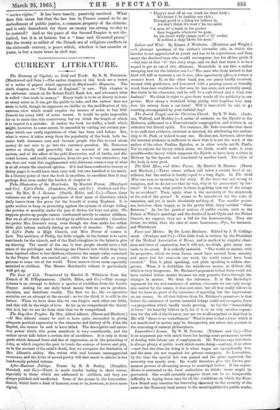Force and Matter. By Dr. Louis Biichner. Edited by J.
F. Coning-
wood. (Trubner and Co.)—This little book is written by the President of the Medical Association of Hesse, and is marked by singular clear- ness and force of expression, but it will not, we think, gain many con- verts to its creed. It is nakedly material. "The world or matter, with its properties, which we term forces, must have existed from eternity and. must last for ever—in one word, the world cannot have been created." This is plain speaking, and plain speaking is seldom dan- gerous. When it is forbidden the unbeliever sneers, as Gibbon did, which is very dangerous. Dr. Buchner's argument is that force could not have existed before matter because we only perceive force through the changes in matter. We deny the inference. It is like Berkeley's argument for the non-existence of matter,—because we can only recog- nize matter by the senses, it does not exist, but all that really follows is that we have no proof of the existence of anything but the impressions on our senses. So all that follows from Dr. Biichner's premisses is that before the existence of matter material beings could not recognize force —a proposition which hardly needs proving. As for the "immortality of force " we heartily believe in it, for it is to us only another expres- sion for the will of the Creator, nor are we at all surprised to find that in His will "there is no variableness." What is true is that a force which is not manifested in matter may be disregarded, not taken into account in the reasoning of natural philosophers.






























 Previous page
Previous page